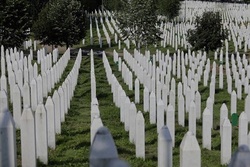 The Supreme Court of the Netherlands has upheld an earlier ruling that found the country partly liable for the deaths of 350 Bosnian Muslims in Bosnia's Srebrenica massacre in 1995.
The Supreme Court of the Netherlands has upheld an earlier ruling that found the country partly liable for the deaths of 350 Bosnian Muslims in Bosnia's Srebrenica massacre in 1995. RNA - The government has only "very limited liability" for the deaths of Muslims in the Srebrenica massacre, the Dutch Supreme Court said on Friday.
It added that the state had 10 percent liability and that the compensation will be paid only to the families of 350 Muslims men.
In 2002, the entire Dutch cabinet stepped down in the aftermath of a report on the Netherlands' role in the mass killing.
Bosnian Serb forces killed a total of 8,000 Muslim men in the town of Srebrenica in 1995. The Dutch had been guarding a UN safe zone when it was overrun.
Some 30,000 Bosnian civilians were also displaced in and around the town of Srebrenica in Bosnia and Herzegovina by units of the Army of the Republika Srpska under the command of General Ratko Mladic.
The mass killings were branded genocide by international courts and both Bosnian Serb wartime leader Radovan Karadzic and military commander Ratko Mladic were sentenced by a UN war crimes court to life in prison.
On July 12, Iran's Foreign Minister Mohammad Javad Zarif said the worst mass killing of Muslims “mustn’t be forgotten”.
He made the comments on the 24th anniversary of the killing of thousands of Muslims in southeastern Europe.
To mark the anniversary, European Union foreign policy chief Federica Mogherini and EU enlargement commissioner Johannes Hahn issued a joint statement, calling the killings as “genocide.”
In the statement, they described the mass killing as “one of the darkest moments of humanity in modern European history.”
“There is no place for inflammatory rhetoric, for denial, revisionism or the glorification of war criminals,” said the statement.
“Attempts to rewrite history in Bosnia and Herzegovina or anywhere are unacceptable,” it added.
847/940